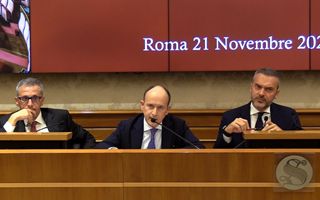(Finance) – “The increase in Bb&Bs and of the holiday homes had a significant impact on the housing emergency. In cities with a tourist vocation, over 15% of homes are intended for short-term rentals and the number of advertisements through online platforms exceeds 500 thousand units. Over 50 thousand students are affected by the housing shortage in cities such as Milan, Rome and Bologna not to mention the homeless”. This is what he underlines John Toddepresident of Economic Study Centerduring the press conference “Housing emergency in metropolitan cities”, which took place in the Caduti di Nassirya room in Palazzo Madama, with the help of Ciro Di Pietro, chief restructuring officer.
For Todde, “regulation is needed of this phenomenon, predicting a maximum limit of days per year for the use of homes intended for this purpose and incentives for long-term rentals with a remodulation of public housing regulations favoring the less well-off and young couples. Even the Tax leverage can be useful with a progressive taxation to be allocated to social housing for those who use the apartments for hospitality”.
The appeal to the government to engage on this issue was launched by Luigi Navesenator of the M5s Environment and Public Works commission at Palazzo Madama, according to which “the government must commit to fight the housing emergency instead of safeguarding speculation in the building sector by supporting young people, large families and the less well-off. As M5s we proposed replenish the default fund innocentfor rentals and for those under 36″.
On the need for regulatory a rapidly expanding sector like that of short-term rentals he intervened Amedeo Di Pietrocassation lawyer and president of the National Observatory on Law, who calls for regulation for “overcome regulatory uncertainty relating to these types of contracts which involve important critical issues to the detriment of families and students as well as having heavy repercussions on the activities of the courts”.
The legislative analysis of the phenomenon was entrusted to Fulvio Baldideputy attorney general at the Court of Cassation, according to which “lprivate economic activity is free but must strive for common well-being“https://www.Finance.it/DettaglioNews/213_2024-11-21_TLB/.”Short-term rental is preferred to long-term rental for various reasons – he states – which concern the amount of payments, the state in which the property and the delays are left for the defaulters. We need to act on these points to rebalance the use of housing.”
To illustrate the possible solutions adopted in other EU countries it was the lawyer Danilo D’Andreanational councilor of the Union for Justice, who recalls “in Paris since 2017 a maximum limit of 120 days for the rental of the main property. Once this limit is exceeded, a change of intended use is mandatory with a much higher tax rate which discourages the possibility of opting for short-term rentals. In Barcelona by 2028 they will be eliminated over ten thousand licenses to free up as many apartments for families and students”.
The analysis of solutions from a tax point of view characterized the intervention of Renato Buriganapresident of Conepro (Professional Accountants Network), who states that “we need to intervene on various aspects starting from diversification of taxation between short and long-term rentals, creating a greater availability of properties on the market; encourage renovations on properties intended for long rentals as well as the possibility of reviewing the tax exemption thresholds for rentals”.
